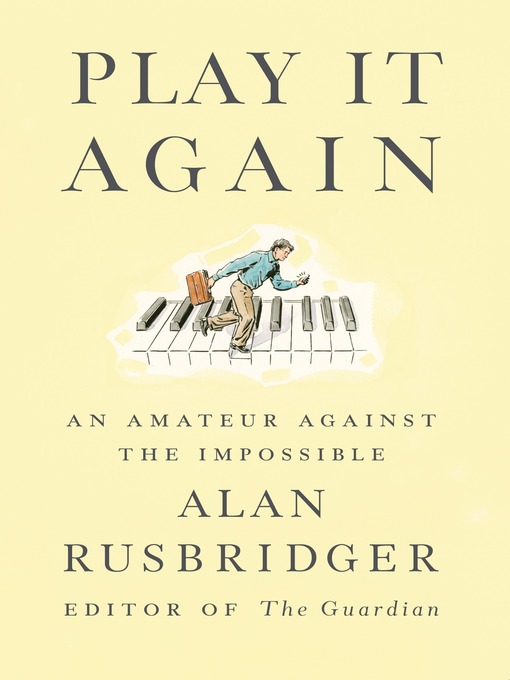
Play It Again
An Amateur Against the Impossible
- اطلاعات
- نقد و بررسی
- دیدگاه کاربران
نقد و بررسی

June 24, 2013
The struggle to keep up an inspiring musical hobby while maintaining a manic, high-powered career animates this sprightly memoir. Rusbridger, editor of London’s Guardian newspaper and an amateur pianist, spent 18 months learning Chopin’s Ballade in G Minor, a piece whose treacherous rhythms, blindingly fast filigree, thunderous chords, and death-defying keyboard leaps give fits to concert virtuosos. Rusbridger’s account of trying to learn this widow-maker by practicing 20 minutes a day—longer sessions resulted in “burning shoots of pain”—makes an absorbing study in the intricate, exasperating physical niceties of high-performance piano playing. (His long-winded conversations with concert pianists from Daniel Barenboim to Murray Perahia on the meaning and emotional impact of the piece are less interesting, as talk about music tends to be; their pensées are usually as inchoate as Chopin’s chromaticisms.) Meanwhile, Rusbridger handles breaking news (at one point he finds himself rehearsing the piece in war-torn Tripoli) and collaborates with Julian Assange on WikiLeaks revelations. The reader follows Rusbridger as he squeezes practice and a social life built around impromptu musicales into an unforgiving news cycle; the result is a vibrant tale of work-life balance—and an imaginative case for the continuing importance of amateurism in a world fixated on professional expertise. Photos.

July 1, 2013
The editor of the Guardian recalls his months trying to deal with significant international news stories while also practicing a moving Chopin piece so difficult to play that he often wondered if it was beyond him. In the summer of 2010, Rusbridger, impressed with a fellow amateur who played Chopin's G Minor Ballade, resolved that he would take a year to learn the piece then perform it the following summer. But life interrupted. Intervening were several massive news stories, including the WikiLeaks/Julian Assange controversy and the revelations that members of Rupert Murdoch's News of the World staff had hacked telephone accounts. (Rusbridger's publication was out front on both stories.) In addition to editing the paper, writing editorials and practicing Chopin, the author was playing in some ad hoc chamber groups, traveling the globe, building and furnishing a music studio, looking to buy a classic piano, attending concerts, and dining with friends, family and notables--and, one wonders, sleeping? Written in the form of a journal, the volume sometimes resembles the autobiography of a startled wren. The author does maintain an appealing tone of self-deprecation when he confronts Chopin (the piece continually frustrates and even defeats him), and he adds a thin glaze of self-help/inspirational icing (it's good to challenge yourself, he says, whatever your age), but what's missing (other than a few words in the acknowledgements) is any sense of the enormous gratitude he surely felt for the numerous talented (and in some cases celebrated) musicians who helped him prepare, the wealth and health needed for all the travel, lessons, research and equipment. It's one thing to say, "challenge yourself"; it's another to have the wherewithal to do so. He concludes with an account of his public performance, which occurred some months after his original deadline. The chronicle of a passionate professional and musical life lived at breakneck speed.
COPYRIGHT(2013) Kirkus Reviews, ALL RIGHTS RESERVED.

August 1, 2013
The editor of The Guardian recounts his quest to master a notoriously difficult piano piece in this inspiring book, a tale of perseverance in the face of enormous odds. During a period of more than a year marked by the WikiLeaks and phone-hacking scandal stories, amateur musician Rusbridger carves out the time in his demanding schedule to learn Chopin's Ballade No. 1 in G minor. With great detail, down to the fingering of the piece, the series of diary entries will interest the musically minded most strongly, although it's possible for nonmusicians to comprehend. Rusbridger speaks to experts and enthusiasts in several different fields to deepen his understanding of the piece and the impact of making music on the brain. Like the Chopin piece, reading this account requires dedication but holds rewards for those who make the effort. As his deadline looms, the drama mounts. Can he master the Ballade and answer his questions about the quest: Is there time for such an endeavor, or is it too late to try?(Reprinted with permission of Booklist, copyright 2013, American Library Association.)

April 15, 2013
The year Guardian editor Rusbridger decided to learn Chopin's magnificent Ballade No. 1 in G minor saw the Arab Spring and the paper's breaking two major stories: WikiLeaks and the News of the World phone-hacking scandal. He still practiced, even in a Libyan hotel with gunshots ringing in his ears.
Copyright 2013 Library Journal, LLC Used with permission.

October 15, 2013
Rusbridger (editor of the Guardian) is a professional journalist and an amateur pianist. In this book, he tells the story of a late-life struggle with Chopin's Ballade in G Minor, a tale that's set against the backdrop of his day job: editor of one of the world's leading news organizations. Vowing to learn the Ballade in a year despite his hectic schedule, Rusbridger charts his progress, both with the Ballade and in his day job, in diary form. While this title is similar to Jasper Rees's amateur quest to achieve French horn mastery in A Devil To Play, there are differences as well--Rusbridger provides more detail on fingerings and other technical matters (he also offers "Score" and "Commentary" sections) and imparts fascinating details concerning WikiLeaks, the phone-hacking scandal, and other major stories reported by the Guardian. Along the way, the author discusses his "Chopin project" with some of the best-known pianists (both professional and amateur) in the world, among them Charles Rosen, Richard Goode, Condoleezza Rice, and Murray Perahia. VERDICT An engaging personal memoir, this title will appeal to amateur musicians, memoir aficionados, and those interested in news/current events.--Bruce R. Schueneman, Texas A&M Univ. Lib., Kingsville
Copyright 2013 Library Journal, LLC Used with permission.




دیدگاه کاربران